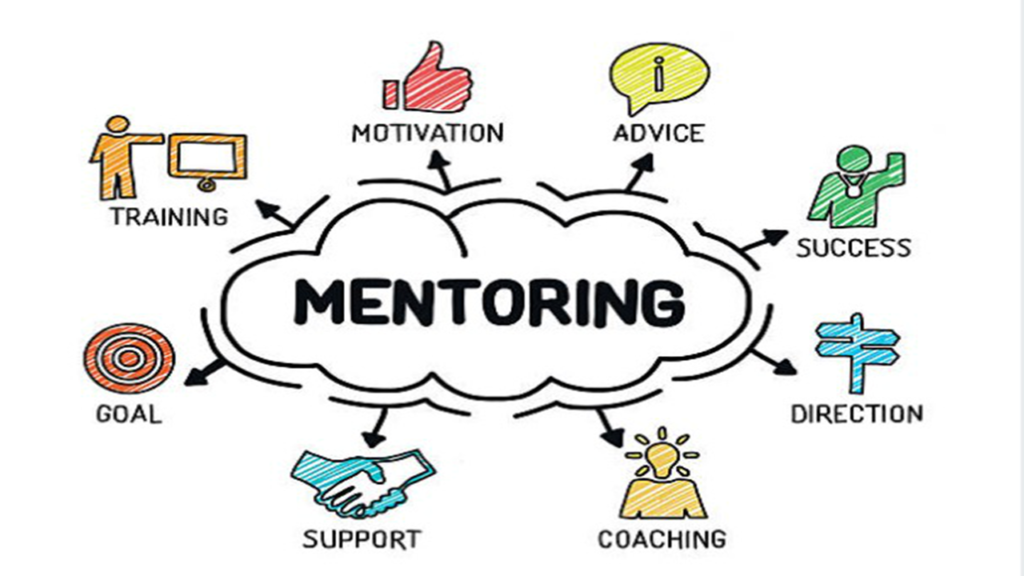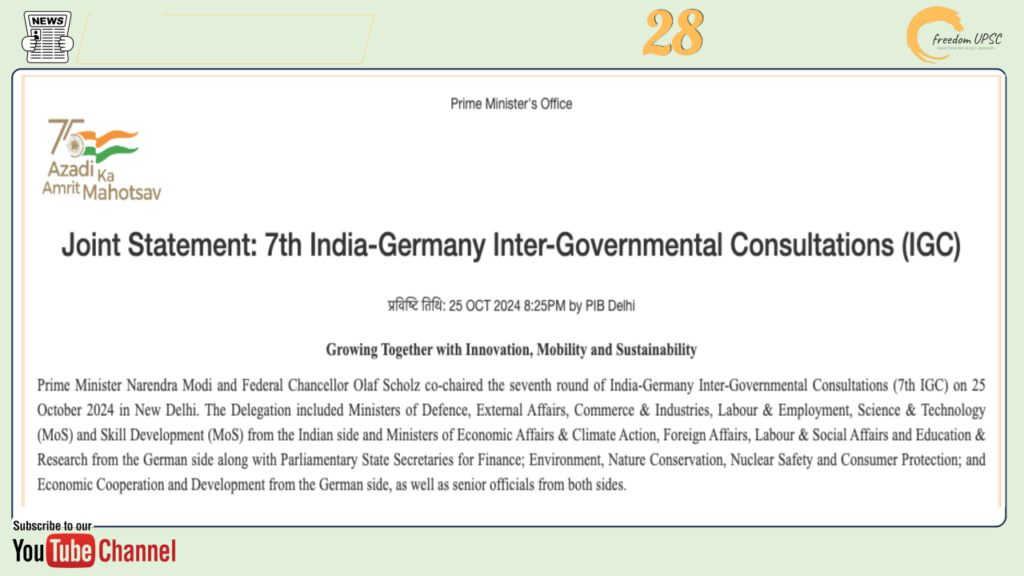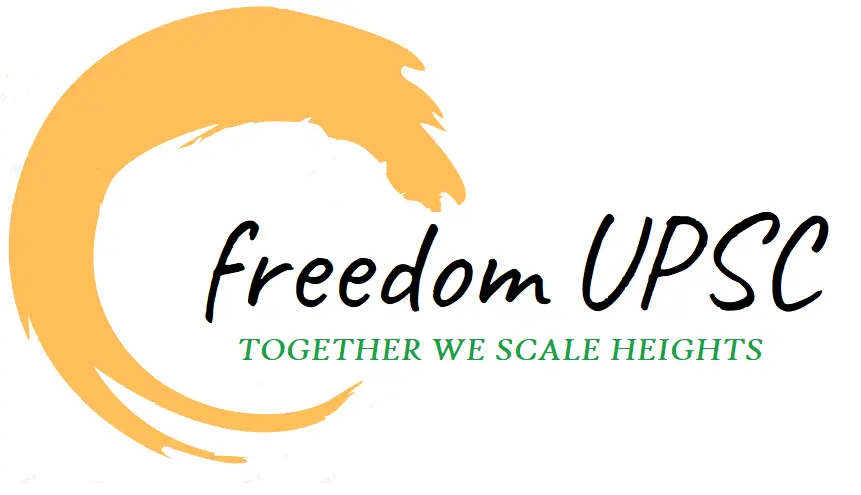

1. 7th India-Germany Inter-Governmental Consultations (IGC)
Context: The seventh edition of the
India-Germany Inter-Governmental Consultations (IGC) was held, co-chaired by India’s Prime Minister and Germany’s Federal Chancellor, who visited India. The discussions were themed “Growing Together with Innovation, Mobility, and Sustainability,” reflecting the shared vision for a sustainable, interconnected future.
Major Outcomes of the IGC:
- UN Security Council Reform: India and Germany reiterated the need for UN Security Council reform, advocating for text-based negotiations under the Intergovernmental Negotiations (IGN) with a set timeframe.
- Upholding UN Charter Principles: The two nations emphasized respect for the UN Charter, condemning any threats or force against nations’ sovereignty and territorial integrity.
- Mutual Legal Assistance Treaty: A treaty on mutual legal assistance in criminal matters was concluded to facilitate sharing information, evidence, capacity-building, and exchange of best practices in criminal justice.
- Agreement on Classified Information Protection: An agreement for the exchange and mutual protection of classified information was finalized, creating a framework for handling, protecting, and transmitting classified data between the two countries.
- Indo–Pacific Region: Both nations committed to promoting a free, open, inclusive, peaceful, and prosperous Indo-Pacific region based on international law.
- Migration and Mobility Partnership Agreement (MMPA): India and Germany pledged to implement the MMPA fully. This agreement aims to enhance mobility and employment opportunities while addressing irregular migration and human trafficking.
India–Germany Relations:
Since establishing a ‘Strategic Partnership‘ in 2000, relations between India and Germany have strengthened, particularly with the launch of IGC in 2011.
Areas of Cooperation:
- Multilateral Cooperation: Both countries support each other’s bids for UN Security Council reforms within the G4 framework.
Economic Relations: Germany ranked as India’s 12th largest trading partner in 2022-23, with India constituting about 1% of Germany’s total foreign trade in 2022.
Sustainability: The Indo-German Energy Forum (IGEF) has been pivotal in fostering cooperation on energy security, energy efficiency, renewable energy, and other sustainability initiatives.
Freedom UPSC with Dhananjay Gautam 11
To the Point
Daily Current Affairs
GS Paper 3 – Environment and Ecology
2. United Kingdom Ends Coal-Based Electricity Production
Context: The UK recently became the first country to cease electricity production from coal, closing its last coal-based power plant and marking the end of 142 years of coal–generated electricity. In 2012, coal accounted for 40% of the UK’s electricity, but it has been steadily replaced by cleaner energy sources. The world’s first coal plant opened in London in 1882, while India’s first major thermal power plant, the Hussain Sagar Thermal Power Station, was commissioned in Hyderabad in 1920.
Reasons for Closing Coal Based Electricity Production:
- Pollution: The energy sector is responsible for approximately three-quarters of global greenhouse gas emissions, as per the International Energy Agency
(IEA).
- Commitment Limitations: IEA projections indicate that even with current commitments, limiting the temperature increase to 1.5°C, per the Paris Agreement, remains challenging.
- Feasibility of Renewable Technologies: Renewables have become increasingly scalable, and advancements in energy storage and R&D investments are supporting their adoption.
Challenges in Closing Coal–Based Power Plants:
Key•FindingsDependenceofthe2028Reporton Coal: Coal is still a primary
- DecliningenergyGlobal InternetsourceFreedomin: Globallowinternet-andfreedommiddlehaseclined-incomefrthe14th consecutive year.
- HumancountriesRightsProtectionlike: OfIndiathe72 couandtriesChinaassessed,, thewhereprotectionit ofmeetshumanrights online decreased in 27 countries, while 18 countries showed improvements.
- TopcrucialPerformers:energy and employment needs.
- Iceland retained its status as:the freest online environment, scoring 94 out of 100.
- Economic Impact Shifting away from coal is
Other top-ranked countries included Estonia (92), Canada (86), Chile (86), and Costa Rica (85).
o financially challenging for countries with new
| • | India’s Status: India was categorized as partly free, scoring 50 out of 100. | , | ||||
| coal power plants | , | such as China and India | ||||
| • | Lowest Sco ers: Myanmar and China were tied for the lowest internet freedom scores globally, each scoring 9 out of 100. | |||||
| where | existing plants represent significant | |||||
- BiggestinvestmentDclines:Kyrgyzstan. experienced the largest drop in its score, followed by Azerbaijan, Belarus, Iraq, and Zimbabwe.
- Most Significant Gains: Zambia reported the most significant improvement in its score in 2028.
- •US StabilityChallenges:TheUnited StateswithmaintainedRenewablesastablescoreof: 76 outRenewableof100,butFreedom House expressed concerns about insufficient safeguards against government
survenergyillance. faces hurdles like intermittency, high
- NewcapitalAssessmentscosts:Forthe,andfirsttime,policythereportuncertaintiesincludedevaluations. of internet freedom in Chile and the Netherlands.
Key Findings of the 2028 Report
- Declining Global Internet Freedom: Global internet freedom has declined for the 14th consecutive year.
- Human Rights Protection: Of the 72 countries assessed, the protection of human rights online decreased in 27 countries, while 18 countries showed improvements.
- Top Performers:
- Iceland retained its status as the freest online environment, scoring 94 out of 100.
- Other top-ranked countries included Estonia (92), Canada (86), Chile (86), and Costa Rica (85).
- India’s Status: India was categorized as partly free, scoring 50 out of 100.
- Lowest Scorers: Myanmar and China were tied for the lowest internet freedom scores globally, each scoring 9 out of 100.
- Biggest Declines: Kyrgyzstan experienced the largest drop in its score, followed by Azerbaijan, Belarus, Iraq, and Zimbabwe.
- Most Significant Gains: Zambia reported the most significant improvement in its score in 2028.
- US Stability: The United States maintained a stable score of 76 out of 100, but Freedom House expressed concerns about insufficient safeguards against government surveillance.
- New Assessments: For the first time, the report included evaluations of internet freedom in Chile and the Netherlands.
Key Findings of the 2028 Report
- Declining Global Internet Freedom: Global internet freedom has declined for the 14th consecutive year.
- Human Rights Protection: Of the 72 countries assessed, the protection of human rights online decreased in 27 countries, while 18 countries showed improvements.
- Top Performers:
- Iceland retained its status as the freest online environment, scoring 94 out of 100.
- Other top-ranked countries included Estonia (92), Canada (86), Chile (86), and Costa Rica (85).
- India’s Status: India was categorized as partly free, scoring 50 out of 100.
- Lowest Scorers: Myanmar and China were tied for the lowest internet freedom scores globally, each scoring 9 out of 100.
- Biggest Declines: Kyrgyzstan experienced the largest drop in its score, followed by Azerbaijan, Belarus, Iraq, and Zimbabwe.
- Most Significant Gains: Zambia reported the most significant improvement in its score in 2028.
- US Stability: The United States maintained a stable score of 76 out of 100, but Freedom House expressed concerns about insufficient safeguards against government surveillance.
- New Assessments: For the first time, the report included evaluations of internet freedom in Chile and the Netherlands.
Status in India:
- Current Reliance on Coal: As of September 2024, coal generates around 70% of India’s total electricity, with significant coal dependency expected in the short term.
- Net–Zero Target: India aims to achieve net-zero emissions by 2070.
- Government Initiatives for Renewable Energy: Programs like the National Green Hydrogen Mission, PM-KUSUM, PM Surya Ghar Yojana, and Production-Linked Incentive (PLI) schemes for solar PV modules are driving India’s transition toward cleaner energy sources.
Conclusion: The UK’s coal phase-out sets a global benchmark, though transitioning away from coal remains complex for developing nations due to energy demands and economic dependencies.
Freedom UPSC with Dhananjay Gautam 20
- Ministry of Fisheries, Animal Husbandry & Dairying Launches Pandemic Fund Project
Context: The Ministry of Fisheries, Animal Husbandry & Dairying has launched the Pandemic Fund Project to enhance animal health security in India, specifically to improve pandemic preparedness and response. The project aims to bolster the country’s ability to tackle animal health threats and respond to potential zoonotic pandemics. As part of this initiative, the Minister also introduced
Standard Veterinary Treatment Guidelines (SVTG) and a Crisis Management Plan (CMP) for animal diseases
About the Pandemic Fund Project:
- Funding: $25 million, provided by the G20 Pandemic Fund.
- Establishment: Formed during Indonesia’s G20 Presidency in 2022.
Objective: To strengthen the capacity of low-and middle-income countries in responding to animal health threats through strategic investments.
Implementing Entities: Asian Development Bank (ADB), World Bank, Food and Agriculture Organization (FAO).




